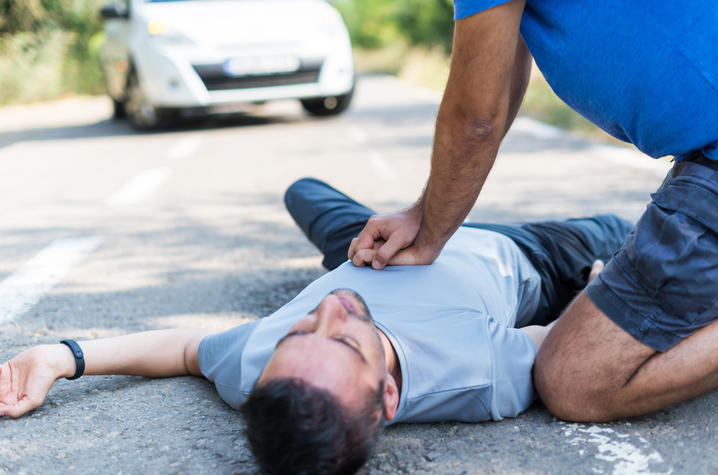Two Minutes Can Save a Life — Learn Hands-Only CPR

The University of Kentucky Public Relations & Strategic Communications Office provides a weekly health column available for use and reprint by news media. This week's column is by Jacob Stone, director of the cardiac rehabilitation clinic at the UK HealthCare Gill Heart & Vascular Institute.
LEXINGTON, Ky. (Feb. 21, 2022) — About 70% of out-of-hospital cardiac arrests happen at home, and less than 46% of people who experience an out-of-hospital cardiac arrest receive the immediate help that they need before professional help arrives.
Cardiopulmonary resuscitation, or CPR, can greatly increase a person’s chance of survival when administered immediately. A simplified version of CPR, called Hands-only CPR, requires no mouth-to-mouth breathing or special certification. It can be learned in two minutes and is just as effective at improving survival rates for cardiac arrest events that happen at home.
A patient has a much better chance of surviving a heart attack if someone begins CPR immediately instead of waiting for emergency personnel to arrive. Since Hands-only CPR is simpler to perform, more people without medical training will be comfortable performing this technique.
If you see someone lose consciousness, collapse and stop breathing:
- Check to see if the person is responsive. Shake them and ask if they’re okay.
- Call 911 on your cell phone and put it on speaker so you can communicate with the dispatcher.
- Start CPR immediately. Push down hard fast with two hands in the center of the chest to the beat of a familiar song that has 100 to 120 beats per minute such as “Stayin’ Alive” or “Baby Shark”.
- Continue CPR without interruption until emergency personnel arrive.
If you or someone else is experiencing chest pain (especially if it is associated with shortness of breath or lightheadedness), call 911 immediately. Do not drive yourself or the patient to the emergency department – paramedics have the expertise and equipment to provide the best care quickly.
Studies have shown that the chances of survival from a cardiac event vary greatly from city to city. Factors such as how close you are to a hospital or average ambulance time can affect a person’s outcome. But one of the biggest determiners is the number of people in your community who know CPR. The more people around you who have CPR training, the more likely one will be around when you need it.
As the state’s flagship, land-grant institution, the University of Kentucky exists to advance the Commonwealth. We do that by preparing the next generation of leaders — placing students at the heart of everything we do — and transforming the lives of Kentuckians through education, research and creative work, service and health care. We pride ourselves on being a catalyst for breakthroughs and a force for healing, a place where ingenuity unfolds. It's all made possible by our people — visionaries, disruptors and pioneers — who make up 200 academic programs, a $476.5 million research and development enterprise and a world-class medical center, all on one campus.




